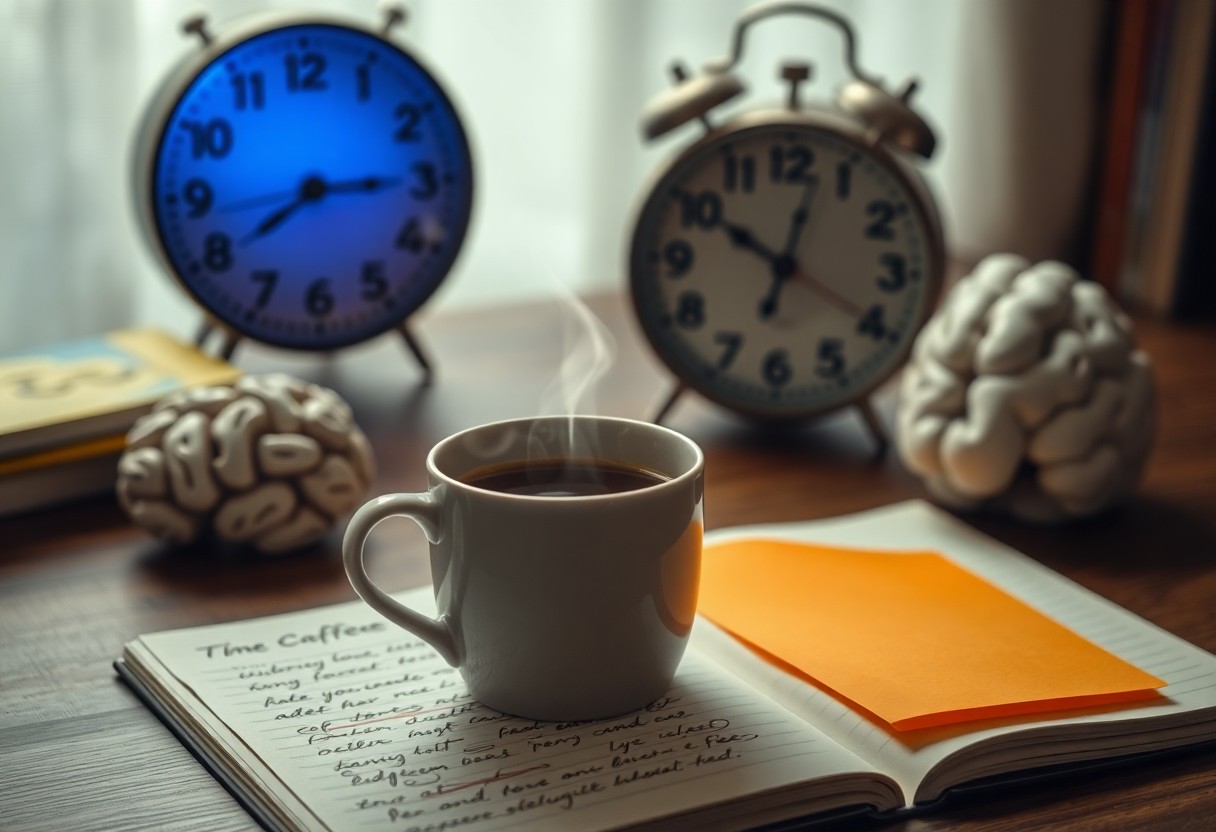There’s a fascinating connection between coffee and your memory that might surprise you. If you often rely on your morning brew to jumpstart your day, you may be curious about how that warm cup impacts your cognitive performance. When consumed in moderation, caffeine can enhance recall and boost mental clarity, making you sharper and more focused. However, be mindful that excessive intake can lead to negative side effects, such as jitteriness or anxiety, potentially hindering your cognitive function. In this post, we’ll explore how your daily caffeine fix affects your ability to retain information.
Key Takeaways:
- Consumption of caffeine in moderate amounts can enhance cognitive function, particularly in tasks involving memory recall.
- Timing of caffeine intake, such as post-learning or before a memory task, may optimize effects on memory performance.
- Individual responses to caffeine can vary, suggesting that while some may experience benefits, others may not see significant improvements.

The Neurological Effects of Caffeine
Caffeine affects your brain in ways that can enhance various cognitive functions, particularly your memory. By blocking adenosine receptors, it prevents feelings of fatigue, leading to heightened alertness. This increased vigilance doesn’t just wake you up but also primes your brain for effective information processing. The result? Your ability to concentrate and recall information improves, making your morning coffee not just a ritual, but a potential brain booster.
How Caffeine Influences Neurotransmitters
Neurotransmitters like dopamine and norepinephrine are significantly influenced by caffeine. These chemicals are responsible for mood regulation, attention, and memory. With caffeine’s ability to enhance their release, you experience heightened cognitive capacity and improved focus. This boost can lead you to perform better in academic and professional settings, as the improved neurotransmitter dynamics support more efficient data retention.
The Impact of Caffeine on Long-Term Memory Formation
Caffeine may also play a pivotal role in strengthening long-term memory. Research suggests that consuming caffeine shortly after learning can enhance memory consolidation, making the information stick more effectively. This process is especially beneficial for improving your ability to recall facts and experiences later on.
Specific studies reveal that participants who ingested caffeine following a learning task showed an impressive 20% improvement in recall ability compared to those who didn’t. The mechanism behind this enhancement involves the presence of adenosine, which influences synaptic plasticity—the brain’s ability to form new connections. By reducing adenosine’s effects, caffeine causes a surge in the encoding and storage of memories, making your cup of coffee a simple yet powerful ally in improving your long-term memory retention and recall.

Brewing Techniques that Maximize Cognitive Benefits
To unlock the cognitive benefits of your coffee, consider your brewing techniques. Brewing methods such as pour-over, French press, and espresso can influence the extraction of caffeine and other beneficial compounds. Experimenting with grind size and water temperature can yield significant differences in potency. For example, a finely ground coffee offers a more concentrated brew, while a coarser grind provides smoother flavors. Whether you prefer a robust espresso shot or a mellow cup of drip coffee, understanding how these techniques impact your drink ensures you’re optimizing its potential for enhancing memory and focus.
Optimal Caffeine Concentrations for Memory Enhancement
Research indicates that consuming between 200 to 400 mg of caffeine can positively influence your memory recall. This translates to about two to four cups of brewed coffee, depending on the strength. Overindulgence can lead to negative side effects, so finding your ideal caffeine concentration is important for reaping cognitive benefits while avoiding jitters or anxiety. Testing different amounts can help you identify what works best for you and enhances your mental acuity effectively.
Timing Your Coffee for Peak Mental Performance
The timing of your coffee consumption can greatly affect its cognitive effects. Consuming coffee in the early morning, particularly between 9:30 AM and 11:30 AM, aligns with natural cortisol levels, optimizing alertness and focus. Additionally, post-lunch, around 1:00 PM to 3:00 PM, is regarded as an optimal window due to the typical afternoon slump most experience. By strategically timing your coffee breaks, you can take full advantage of caffeine’s memory-improving properties and maintain peak performance throughout the day.
Coffee Consumption and its Role in Aging Brains
As you age, the natural decline in cognitive abilities can be concerning. However, research suggests that regular coffee consumption might counteract some effects of aging on your brain. Studies have shown that older adults who consume moderate amounts of caffeine tend to display better memory capabilities and cognitive performance compared to those who do not. This could be linked to the neuroprotective properties found in coffee, which may help to enhance brain plasticity and preserve cognitive functions over time.
Exploring Coffee’s Protective Effects Against Cognitive Decline
Evidence indicates that the antioxidants and anti-inflammatory properties contained in coffee can have protective effects against cognitive decline as you grow older. These compounds may help to reduce oxidative stress and inflammation in the brain, both of which contribute to neurodegenerative diseases. By incorporating coffee into your daily routine, you could potentially bolster your brain’s defenses against the effects of aging, aligning your cognitive health with your lifestyle choices.
The Correlation Between Daily Intake and Memory Retention
Research shows a fascinating link between your daily coffee intake and improved memory retention. Participants in studies consumed various amounts of caffeine, with those drinking approximately two to three cups daily experiencing higher memory retention rates. Interestingly, this relationship appears to plateau beyond moderate consumption, suggesting that too much caffeine could potentially hinder memory performance instead of enhancing it.
In one particular study involving older adults, researchers found that those who drank between 200-400 mg of caffeine daily—equivalent to about two to four cups of coffee—performed significantly better on memory tests compared to those with lower or no caffeine intake. The results indicate that your body benefits from maintaining this moderate level of caffeine, as it not only aids in memory retention but could also fend off the cognitive decline associated with aging. Balancing your coffee consumption might just be the key to keeping your mind sharp.
Practical Tips for Integrating Coffee into Your Memory Routine
Incorporating coffee into your daily regimen can enhance your cognitive function positively. Here are some simple ways to make the most of your morning brew:
- Enjoy a cup ofcoffee before engaging in studying or brain-stimulating activities.
- Limit your caffeine intake to moderate amounts, ideally around 200-400 mg per day.
- Combine your coffee with practices like mindfulness or focused tasks.
- Experiment with different coffee types to find which enhances your focus the best.
This approach can help optimize your cognitive performance.
Strategies for Mindful Coffee Drinking
Mindful coffee drinking transforms your routine into a moment of clarity. Pay attention to the aroma, flavor, and warmth of your drink as you sip slowly, allowing yourself to truly appreciate it. Pairing this experience with calming activities like deep breathing or brief meditation can amplify the positive effects on your memory function. Such practices train your brain to focus better, leading to improved recall when you need it most.
Pairing Coffee with Other Memory-Boosting Foods
Boosting your memory isn’t just about coffee alone; certain foods can enhance its effects. Pairing your cup with items rich in antioxidants, omega-3 fatty acids, and vitamins can create a powerful combination for improving cognitive function. For instance, consider adding berries, nuts, or a slice of avocado toast to your breakfast routine. These foods are known for their memory-boosting properties and complement caffeine’s stimulating effects.
Incorporating nutrient-dense foods alongside your coffee will further support brain health. Berries are packed with antioxidants, which can combat oxidative stress in the brain, while nuts provide healthy fats critical for cognitive performance. Foods rich in omega-3s, like walnuts or flaxseeds, play a role in enhancing connection efficiency among brain cells. By structuring meals around this synergy, you create a robust memory-enhancing routine that fuels both energy and focus throughout the day. This approach fully harnesses the potential of coffee as a memory aid while ensuring you feed your brain the nutrients it needs to thrive.
Caffeine Myths Debunked: Separating Fact from Fiction
Many myths surround caffeine consumption and its effects on memory. One common misunderstanding is that caffeine always leads to dependency, making users unable to function without it. In reality, moderate consumption does not create a strong dependency but rather can be a tool to enhance performance and alertness. Scientific studies have shown that occasional users can experience similar cognitive benefits without the need for daily intake, proving that myths surrounding caffeine often exaggerate its impact on your daily life and mental agility.
Misconceptions About Caffeine Dependency and Memory
People often believe that caffeine dependency severely impacts your ability to recall information, leading to poor memory performance. However, studies demonstrate that caffeine users can maintain cognitive function, and any dependency usually only results in mild withdrawal symptoms, like headaches, rather than a significant impact on memory recall.
The Truth Behind Tolerance and Cognitive Effects
As you consume caffeine regularly, your body may develop a tolerance, requiring higher doses to achieve the same effects. Yet, interestingly, this does not necessarily translate to diminished cognitive performance. Research indicates that while your tolerance may increase, modest amounts of caffeine continue to enhance attention and alertness, which are crucial for memory consolidation and retrieval.
The relationship between tolerance and cognitive effects reveals that while your body adapts to caffeinated beverages, the benefits of caffeine on memory can remain stable. Studies show that even as tolerance builds, cognitive benefits such as improved focus and mental clarity persist, particularly in tasks requiring sustained attention or problem-solving. For instance, research has demonstrated that even habitual consumers can experience enhancements in memory recall during tasks that require quick processing, further challenging the idea that tolerance diminishes cognitive performance. So, even if you find yourself needing that extra cup, your brain may still perform at a heightened level, impressive in its adaptability and resilience.
To wrap up
Conclusively, your morning cup of coffee can have a positive impact on your memory and cognitive performance. The caffeine in coffee enhances various brain functions, including focus and retention. By incorporating this beloved beverage into your daily routine, you may find that your ability to recall information improves. However, moderation is key, as too much caffeine can lead to adverse effects. Therefore, enjoy your coffee mindfully and take advantage of its potential benefits for your memory.
FAQ
Q: How does coffee affect cognitive function?
A: Coffee contains caffeine, a natural stimulant that can enhance alertness and improve concentration. Research suggests that caffeine may boost various cognitive functions, including attention, reaction time, and even certain aspects of memory. It acts by blocking adenosine, a neurotransmitter that promotes sleep and relaxation, thus promoting wakefulness and mental acuity.
Q: Can coffee really help with learning new information?
A: Some studies indicate that caffeine may facilitate learning by enhancing the formation of new memories. When consumed in moderation, coffee can increase levels of neurotransmitters like dopamine and norepinephrine, which play a role in mood and cognitive flexibility. This may lead to better absorption of new information, making it easier for the brain to process and integrate what is being learned.
Q: Is there an ideal time to consume coffee for optimal mental performance?
A: Timing can vary from person to person, but many experts suggest that having coffee during the mid-morning or early afternoon can be particularly effective. This is often when people experience a natural dip in energy levels. Consuming coffee during these times may help enhance focus and productivity throughout the day.
Q: How much coffee is considered beneficial for cognitive improvement?
A: Moderate coffee consumption, typically defined as 3 to 4 cups daily (about 300-400 mg of caffeine), is often associated with cognitive benefits. However, sensitivity to caffeine can vary greatly among individuals. It’s important to listen to your body and adjust your intake accordingly to avoid potential side effects like jitteriness or anxiety.
Q: Are there any potential downsides to drinking coffee for memory enhancement?
A: While moderate coffee consumption can offer cognitive benefits, excessive intake may lead to issues such as insomnia, increased heart rate, and anxiety, which can negatively impact mental performance. Additionally, heavy reliance on coffee for cognitive enhancement can lead to a tolerance buildup, reducing its effectiveness over time. It’s important to maintain a balanced approach and consider other lifestyle factors that contribute to overall brain health.
